The State Bank has issued Circular No. 24/2021/TT-NHNN providing for an independent audit of credit institutions and foreign bank branches (“Circular 24”), whereby Circular 24 will come into effect on April 15, 2022.
The main contents of Circular 24 related to independent audit contents are as follows:
Firstly: Regarding the independent audit of financial statements of credit institutions and foreign bank branches, the following audit contents must be included:
a) Balance sheet;
b) Report on business results;
c) Cash flow statement;
d) Notes to the financial statements.
Secondly: Regarding the independent audit of the operation of the internal control system of the credit institution or foreign bank’s branch, it must include at least the following contents:
a) Auditing the internal control system of the credit institution, and foreign bank branch (including internal mechanisms, policies, processes, and regulations) in compliance with current laws. and regulations of the State Bank on the internal control system of credit institutions and foreign bank branches. For the contents of the internal control system that have been audited for compliance without any change, such content is not required to be re-audited;
b) Auditing the operation of the internal control system for the preparation and presentation of financial statements;
c) In addition to the audit contents specified at Points a and b of this Clause, the commercial bank or foreign bank branch must audit the operation of the internal control system for the content of the internal assessment on the sufficient capital level of commercial banks and foreign bank branches in accordance with the State Bank’s regulations on the internal control system.
Circular 24 takes effect from April 15, 2022.
* This newsletter is only for informational purposes about newly issued legal regulations, not used to advise or apply to specific cases.
Hope the above information is helpful to The Esteemed Readers.
Bizlawyer is pleased to accompany The Esteemed Readers!
On March 23, 2022, the Ministry of Finance issued Official Letter No. 2688/BTC-TCT on value-added tax in Decree No. 15/2022/ND-CP. Accordingly, this Official Letter has detailed instructions on making invoices for the following specific cases:
1. In case a business establishment signs a service provision contract with a collection of money before or during service provision has issued an invoice at the time of collection before February 1, 2022, at the tax rate of 10% but Services completed during the period from February 1, 2022, to the end of December 31, 2022:
– For the amount billed before February 1, 2022, it is not eligible for discount policy VAT;
– For the remaining unpaid amount, invoiced from February 1, 2022, to the end of December 31, 2022, according to the provisions of law, the VAT reduction policy will be applied.
2. In case the business establishment provides goods and services subject to the tax rate of 10% in January 2022, it is not until February 2022 that the business establishment issues an invoice for the revenue from the sale of goods and services. The cases arising in January 2022 are in the case of making invoices at the wrong time and not being eligible for VAT reduction.
3. For invoices made before February 1, 2022, with the VAT rate of 10%, after February 1, 2022, there are errors that need to be adjusted in terms of goods, VAT, or payment. If the goods are returned, the adjusted invoice and the goods return invoice are made with the VAT rate of 10%.
4. For the provision of specific goods and services such as electricity, business establishments are entitled to VAT reduction according to regulations for invoices made from February 1, 2022, to the end of December 31, 2022.
This Official Letter takes effect from March 23, 2022.
On January 11, 2022, the National Assembly promulgated Law No. 03/2022/QH15 to amend a number of provisions in the Enterprise Law 2020 and other related Laws (“Law No. 03”).
Let’s take a look at some new adjustments to the Enterprise Law 2020 with Bizlawyer.
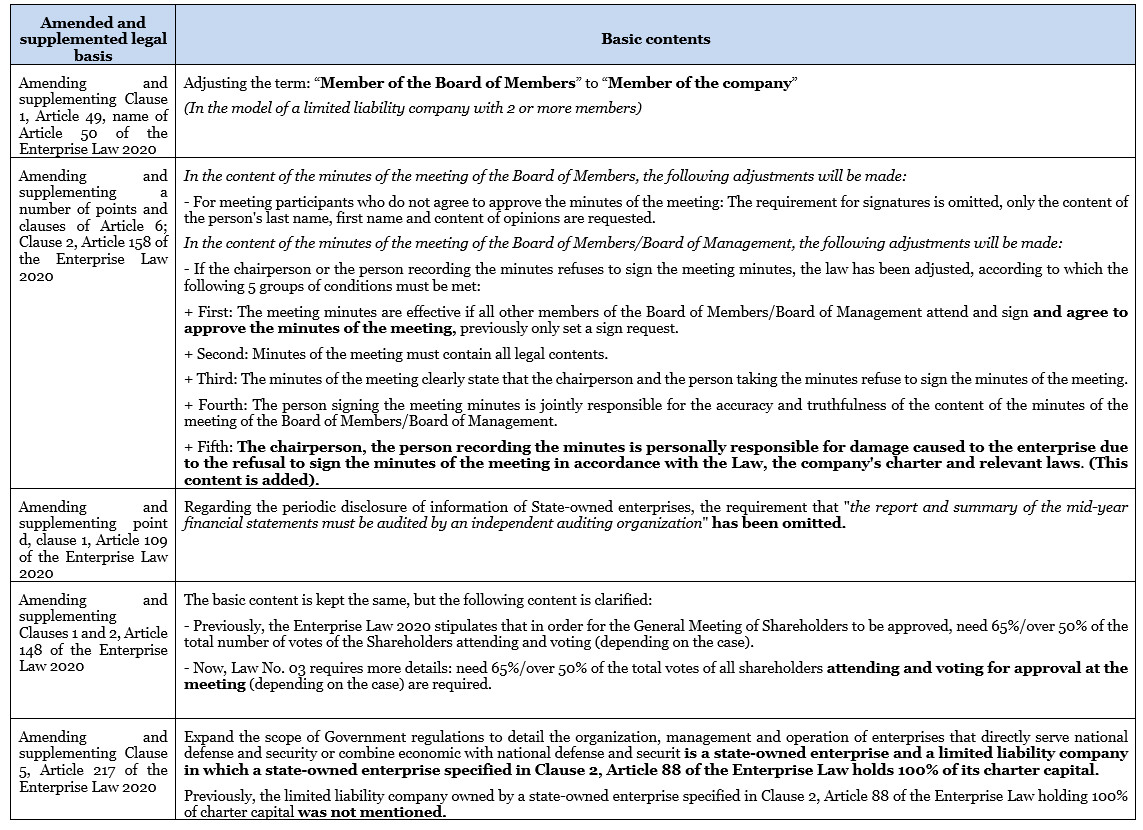
Law No. 03 will officially take effect from March 1, 2022.
* This newsletter is only for informational purposes about newly issued legal regulations, not used to advise or apply to specific cases.
Hope the above information is helpful to The Esteemed Readers.
Bizlawyer is pleased to accompany The Esteemed Readers!
On January 11, 2022, the National Assembly promulgated Law No. 03/2022/QH15 to amend a number of provisions in the Law on Public Investment 2019 and other relevant Laws (“Law No. 03”).
Let’s review with Bizlawyer some new adjustments to the Law on Public Investment 2019.
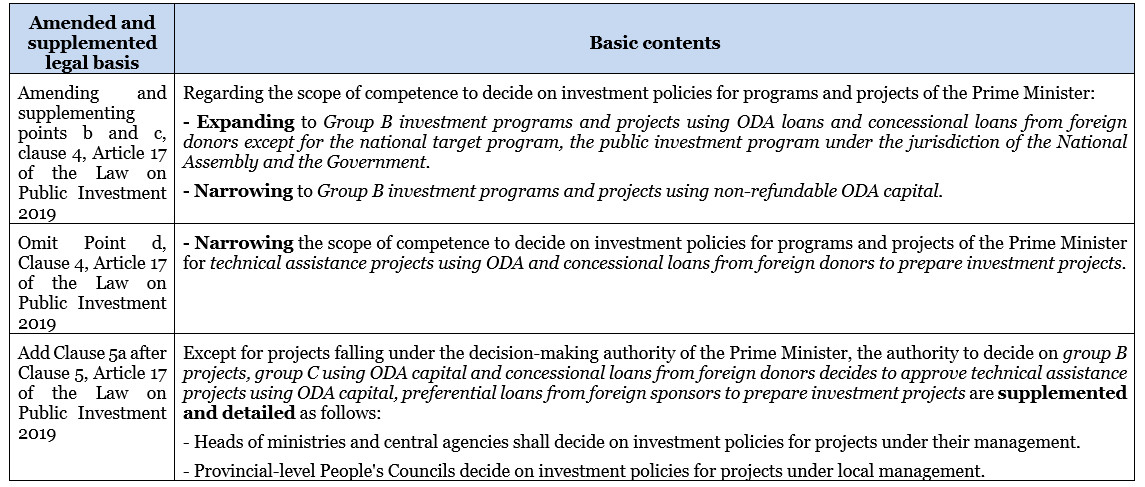
Law No. 03 will officially take effect from March 1, 2022.
* This newsletter is only for informational purposes about newly issued legal regulations, not used to advise or apply to specific cases.
Hope the above information is helpful to The Esteemed Readers.
Bizlawyer is pleased to accompany The Esteemed Readers!
On February 24, 2022, the Minister of Finance issued Decision 206/QD-BTC in 2022 implementing the application of e-invoices in 57 central cities and provinces (“Decision 206”).
Let’s take a look at the main content of Decision 206 with Bizlawyer.
– From April 2022: E-invoices will be required to be applied simultaneously to enterprises, economic organizations, business households, and business individuals in 57 provinces and cities (except for some cases where the conditions are not satisfied) (Previously, from November 2021, in 6 provinces and cities that have applied e-invoices: Hanoi, Ho Chi Minh City, Hai Phong, Phu Tho, Quang Ninh, Binh Dinh).
– The application of e-invoices in 57 provinces and cities must comply with regulations on e-invoices in relevant legal documents.
Decision 206 takes effect from the date of signing.
* This newsletter is only for informational purposes about newly issued legal regulations, not used to advise or apply to specific cases.
Hope the above information is helpful to The Esteemed Readers.
Bizlawyer is pleased to accompany The Esteemed Readers!
On January 15, 2022, the Government of Vietnam issued Decree 10/2022/ND-CP regulating registration fees (“Decree 10”).
The following are the notable points of Decree 10.
– Effective date: March 1, 2022.
– Documents to be replaced by Decree 10:
+ Decree No. 140/2016/ND-CP on registration fees;
+ Decree No. 20/2019/ND-CP amending and supplementing a number of articles of Decree No. 140/2016/ND-CP.
– Guidances on applying new regulations on registration fees:
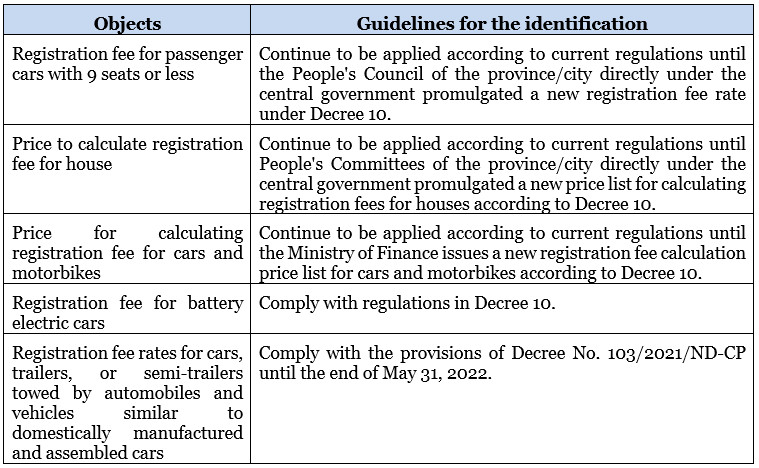
* This newsletter is only for informational purposes about newly issued legal regulations, not used to advise or apply to specific cases.
Hope the above information is helpful to The Esteemed Readers.
Bizlawyer is pleased to accompany The Esteemed Readers!
On January 15, 2022, the Government of Vietnam issued Decree 10/2022/ND-CP regulating registration fees (“ND 10”). NĐ 10 provides for 31 cases of registration fee exemption, here are 07 cases that enterprises and investors may be interested in:
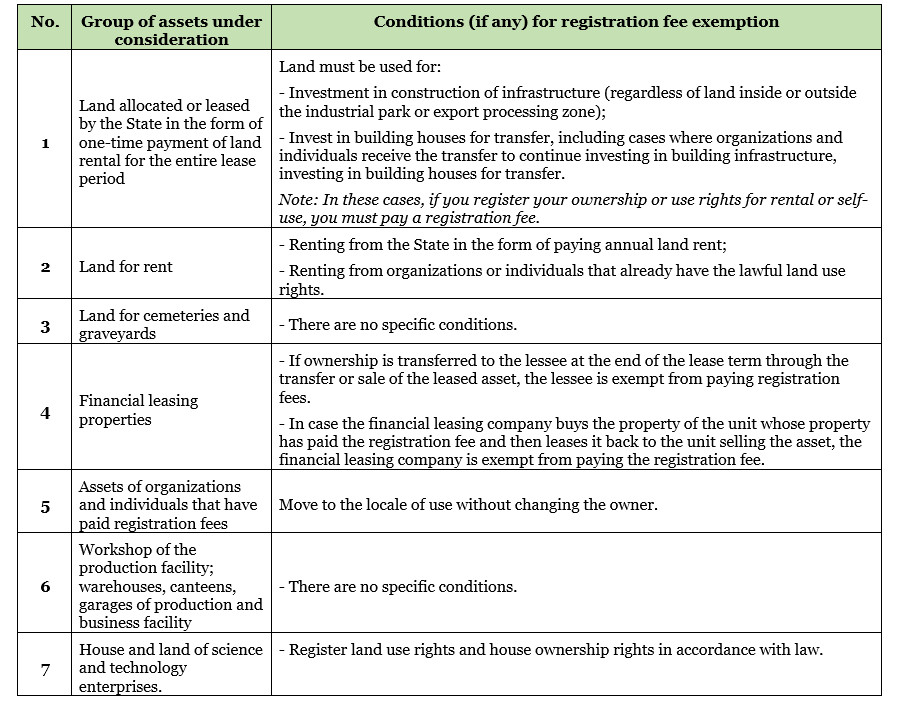
NĐ 10 takes effect from March 1, 2022.
* This newsletter is only for informational purposes about newly issued legal regulations, not used to advise or apply to specific cases.
Hope the above information is helpful to The Esteemed Readers.
Bizlawyer is pleased to accompany The Esteemed Readers!
On December 28, 2021, the Minister of Labor, War Invalids, and Social Affairs issued Circular No. 28/2021/TT-BLDTBXH detailing and guiding the implementation of a number of articles of the Law on Occupational Safety and Health benefits for employees suffering from occupational accidents and occupational diseases. This Circular stipulates the responsibility of the employer for employees suffering from occupational accidents and diseases and social insurance regimes for employees suffering from occupational accidents and diseases, applied from March 1, 2022.
Accordingly, one of the highlights in this Circular is the guidance on handling the occupational accident and occupational disease regime for individual cases, specifically as follows:
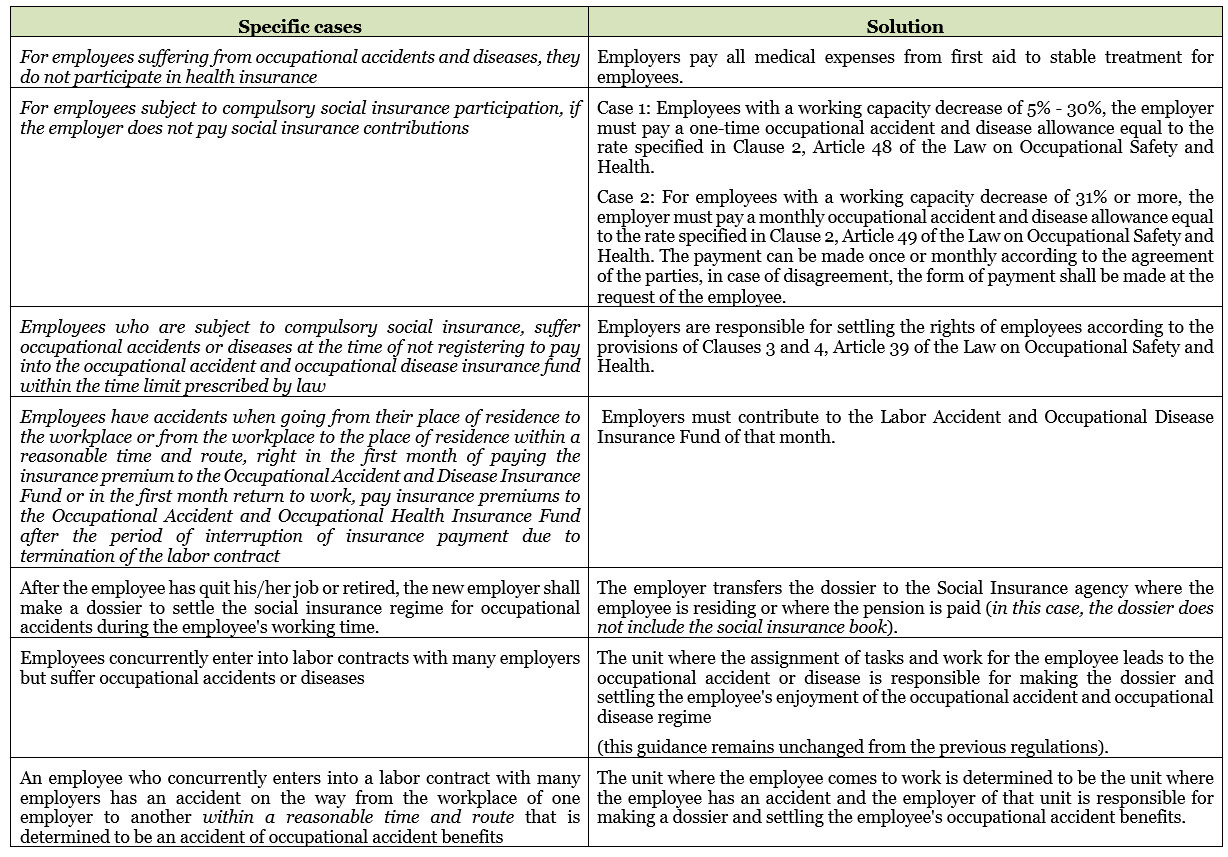
On January 6, 2022, the Government issued Decree No. 02/2022/ND-CP detailing the implementation of a number of articles of the Law on Real Estate Business. This Decree details the conditions for the transfer of contracts for purchase and sale or lease-purchase of future houses, including the following conditions:
– Having a purchase and sale contract, a lease-purchase contract made according to a form in accordance with the provisions of this Decree; in case the parties have signed the contract before March 1, 2022, the signed contract must be signed;
– Those who have not submitted dossiers to request competent state agencies for issuance of certificates of land use rights and ownership of houses and other land-attached assets;
Contracts for sale, purchase, and lease-purchase of houses must be free of disputes or lawsuits;
– Houses under purchase and sale or lease-purchase contracts are not subject to distraint or mortgage to secure the performance of obligations as prescribed by law unless otherwise agreed by the mortgagee.
– The transfer of house purchase and sale contracts or lease-purchase contracts shall apply to the entire contract. In case of buying, selling, or lease-purchase of many houses in the same contract and the parties wish to transfer each house, the transferor must reach an agreement with the investor to amend the house purchase and sale contract or sign the lease-purchase agreement contract addendum before performing the contract assignment.
Note: Transfering of the future housing purchase and sale contracts does not apply to the social housing purchase and sale, lease-purchase contracts
This Decree takes effect from March 1, 2022.
On January 6, 2022, the Government issued Decree No. 02/2022/ND-CP detailing the implementation of a number of articles of the Law on Real Estate Business. This Decree details the conditions of organizations and individuals trading real estate, including the following conditions:
– Must establish an enterprise in accordance with the law on enterprises or a cooperative in accordance with the law on cooperatives, having a business in real estate;
– Must be publicized on the enterprise’s website, at the headquarters of the Project Management Board (for real estate investment projects), at the real estate trading floor (for business cases) business through the real estate exchange information:
+ Information about the enterprise, including name, head office address, contact phone number, name of the legal representative);
+ Information about real estate put into the business in accordance with the law, including Type of real estate; Real estate location; Information on planning related to real estate; The size of the property; Characteristics, properties, usability, and quality of real estate; information on each type of use purpose and common use area for real estate that is a mixed-use building, apartment building; Actual situation of infrastructure works and services related to real estate; Dossiers and papers on ownership of houses, construction works, land use rights and papers related to real estate investment and construction; guarantee contract, written permission to sell, lease-purchase by a competent state agency for the sale, lease-purchase of houses to be formed in the future;
+ Restrictions on ownership, right to use real estate (if any); Price of the real estate sale, transfer, lease, sublease, lease purchase;
+ Information on the mortgage of houses, construction works, real estate projects put into business (if any);
+ Information on the quantity and type of real estate products being traded, the quantity and type of real estate products sold, transferred, lease-purchased, and the remaining quantity and types of products that are still being traded;
(For the publicly available information specified at this point, which then changes, it must be promptly updated immediately after the change).
+ Only trade in real estate that fully meets the requirements of the Law on Real Estate Business.
In addition, for the investor selected as the investor of a real estate project according to the provisions of law, that investor must have equity (i) not less than 20% of the total investment capital for projects with a land-use scale of fewer than 20 hectares; (ii) not less than 15% of the total investment capital for projects with a land-use scale of 20 hectares or more.
This Decree takes effect from March 1, 2022.